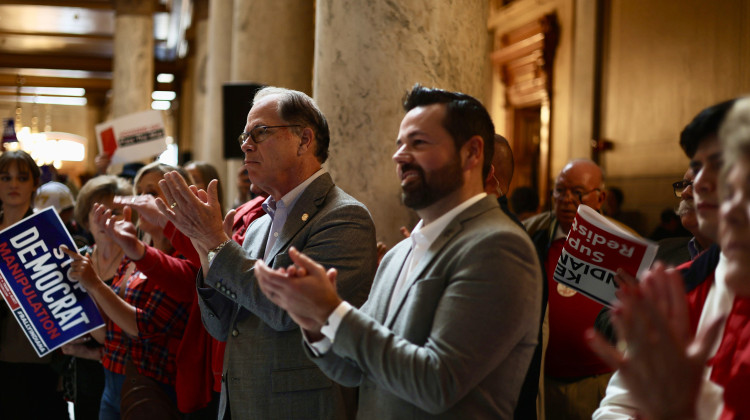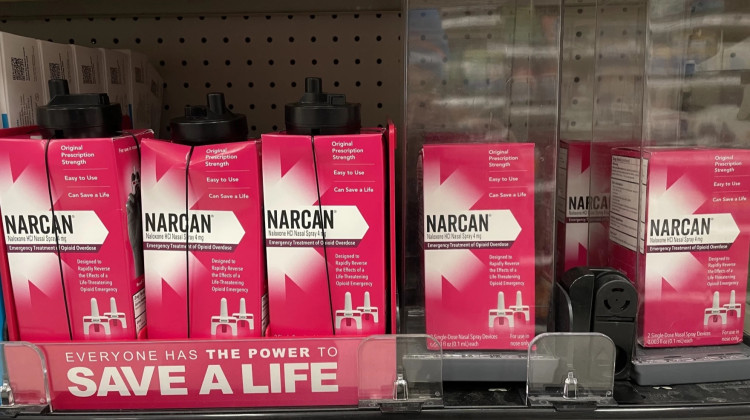
Gov. Eric Holcomb insists voting in-person is safe, if Hoosiers take precautions.
Lauren Chapman/IPB NewsThe Indiana State Department of Health reported 230 additional confirmed deaths over the last week, bringing the state’s total to 4,124 – the largest reported in a single week since mid-May.
In the last week, the state has also reported 19,501 new COVID-19 cases, with more than 182,000 total confirmed cases. The state has reported more than 2,000 cases every day since Oct. 22 – including Thursday, Friday, and Saturday with more than 3,000 new cases each day.
Sunday’s seven-day moving average is 227 percent higher than the rolling average when Indiana began Stage 5. The state’s hospital census on Saturday and Sunday are the second and third highest respectively since the state started releasing that data in April, with 1,740 Hoosiers hospitalized with COVID-19 on Saturday and 1,732 on Sunday.
Here are your statewide COVID-19 headlines from last week.
Indiana Hits 4,000 Confirmed COVID-19 Deaths
The Indiana State Department of Health reported Thursday its 4,000th death since the beginning of the coronavirus pandemic. After a late summer lull, the rate has picked up as cases have increased.
The rate of newly reported deaths had slowed at the end of the summer, averaging around 10 deaths per day from the end of June to the middle of September.
But since mid-September, Indiana’s reported deaths have continued to grow, with 188 new deaths reported in the last week. That recent increase has put the state's weekly death toll in the same range as it was in late May.
Since moving to Stage 5, the state has reported 634 deaths – with Lake, St. Joseph and Vanderburgh counties reporting more than 40 each in that time frame.
More populous counties aren’t exclusively experiencing the increase in deaths: Pike County – which has seen a 130 percent increase in cases – has also had 17 new deaths since the state went to Stage 5. Before September, it had had one.
With 3,649 New Cases, Indiana Sets Its Eighth Single Day Record For New COVID-19 Cases
Thursday’s 3,649 new cases is the eighth one-day record set since the state moved to Stage 5 of its reopening plan.
The state’s seven-day average for cases has increased by 227 percent. In that same time period, 12 counties have more than doubled their number of reported cases. Fountain, Parke and Warren counties have all seen increases greater than 150 percent.
In the last week, ISDH has reported more than 19,000 new cases and 230 new confirmed deaths.
Gov. Eric Holcomb has maintained these worsening numbers are not reason to reinstate any restrictions.
Holcomb Assures Hoosiers Voting In-Person Is Safe, Despite COVID-19 Surge
Gov. Eric Holcomb insists Hoosiers are safe at polling places across the state amid the ongoing pandemic. That’s despite a record new number of COVID-19 cases, long lines at the polls and some county clerks who refuse to follow Holcomb’s mask-wearing order.
Indiana sent counties enough PPE to ensure every poll worker has masks, face shields, gloves and sanitizing equipment. There’s also enough masks to provide them to voters who show up to the polls without one.
But many polling places aren’t requiring voters to have a mask and at least one clerk – in Fountain County – refuses to require their employees to mask up.
Still, Holcomb insists voting is safe, if Hoosiers take precautions.
“Well, they should be concerned and they should mask up and they should physically distance,” Holcomb said.
Indiana Official Says COVID-19 Vaccine Could Be Available As Early As November
Indiana’s state health commissioner says a COVID-19 vaccine could be available for some Hoosiers as early as mid to late November.
Dr. Kris Box said federal officials recently told Indiana to prepare for initial shipments as early as next month.
“We believe the first vaccine that will come out will be Pfizer’s vaccine, which is a two-dose vaccine,” Box said.
Very few doses of the vaccine will be available early on. And the state has developed a distribution plan, with health care workers targeted as the first recipients.
Why Distributing A COVID-19 Vaccine Is Harder Than It Sounds
Pharmaceutical companies are scrambling to develop an effective COVID-19 vaccine and receive FDA approval. In the meantime, states are finalizing plans to distribute the vaccine — and overcome potential challenges.
Tom Duszynski, director of epidemiology education at Indiana University-Purdue University Indianapolis, says there are a lot of questions about setting up distribution systems in the Midwest and across the country.
“How do we move the vaccine from A to B? Are [states] prepared ... when a vaccine arrives?" he says. "Do they have a plan in place then to get it actually in the arms of individuals that need it?
“How are we going to do this safely? Do we have enough people on the ground to process the paperwork as well as actually vaccinated individuals in a timely manner?”
In an Oct. 28 news conference, Indiana State Health Commissioner Dr. Kristina Box said the state "realistically" expects to receive the first doses of a vaccine in mid or late November. Box said it's likely to be the Pfizer vaccine and the timetable is what federal officials have indicated.
As states wait for a COVID-19 vaccine, they’re vetting distribution plans with the CDC. However, Duszynski says following 9/11, state health departments were already required to plan for emergency events on a mass scale.
U.S. Government To Purchase Eli Lilly COVID-19 Antibody Drug Pending FDA Approval
The U.S. government has agreed to purchase 300,000 doses of Eli Lilly’s COVID-19 antibody treatment. It plans to pay $375 million for the vials of the drug.
An additional 650,000 doses could be purchased from the Indianapolis-based pharmaceutical company through June 2021.
Patients who receive the medication distributed by the U.S. government will not have any out-of-pocket costs for the drug, but may have to pay a fee for its administration.
Peer reviewed data published in the New England Journal of Medicine showed the drug may have “potential” in treating mild to moderate COVID-19 patients.
Indiana Academy Of Pediatrics: Health Care Key To Serve Kids During COVID-19
The American Academy of Pediatrics recently released its Blueprint for Children, focused on ways the pandemic affects children’s lives. However, the Blueprint also offers recommendations on how to improve kids’ lives as everyone adjusts to living through the pandemic.
The report emphasizes what many other reports already do: children of color have suffered the most throughout this pandemic. They’ve dealt with higher rates of contracting and dying from COVID-19, as well as losing access to resources that help them meet essential needs.
Dr. Emily Scott is president of the Indiana Academy of Pediatrics, and a pediatrician. She said pediatricians, schools and other agencies have made it their priority to help families meet essential needs throughout the pandemic.
Scott notes that when schools closed at the beginning of the pandemic, so did access to services for millions of kids across the country, most of those services in place to help the most vulnerable kids. She said the most important thing that leaders and policymakers can do for children, is make sure no one gets left behind in terms of health care.
“We just really need to strengthen and protect Medicaid and CHIP and the Affordable Care Act, so that children, no matter their background, are all covered under quality health insurance,” she said.
Shelters Struggle to Combat Domestic Violence Spike Amid Pandemic
At a time when they need her the most, Teshezia George says she’s forced to shutter her shelter doors. That leaves women who have fled domestic violence to sleep in unsafe spaces.
“A lot of times I'm getting off the phone feeling just terrible,” she said, “Because I know these people are going to sleep in their car again or in an abandoned house.”
George, a shelter executive director, said her 14-unit Rainbow-Ark Shelter in Gary is not open to clients while undergoing much-needed renovations. Normally, the shelter invites women and children affected by homelessness, domestic violence or sexual assault to stay for about two months.
Now, it’s just George working solo, stocking shelves and taking on a variety of tasks since social distancing measures have forced her staff to telecommute.
“I think the staff stress level is at an all-time high,” she said. “Everybody's worried.”
Meanwhile calls for support have not slowed down. In fact, the shelter’s crisis line has seen a 50 percent uptick in calls over the past few months, George said.
Eli Lilly Halts Trial For COVID-19 Treatment On Hospitalized Patients
Indianapolis-based Eli Lilly has ended testing its COVID-19 antibody therapy on hospitalized patients. Earlier this month, Eli Lilly temporarily suspended the trial for the drug due to a safety concern.
In a news release, the company said recent data showed there wasn’t a significant difference in outcomes for COVID-19 patients in advanced stages who received the treatment compared to those who did not.
The trial was evaluating recovery chances for severe cases when the drug was administered in combination with an antiviral medication that was recently approved by the Food and Drug Administration.
Contact Lauren at lchapman@wfyi.org or follow her on Twitter at @laurenechapman_.
 DONATE
DONATE






 Support WFYI. We can't do it without you.
Support WFYI. We can't do it without you.